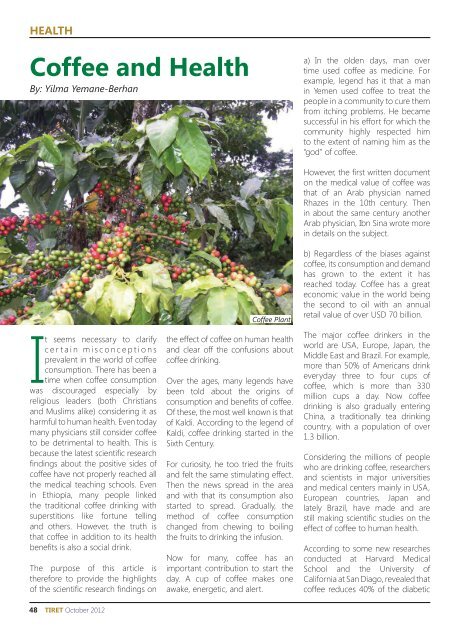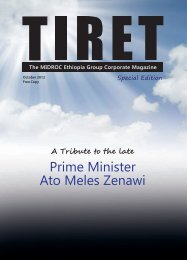TIRET October 2012 Issue - MIDROC Ethiopia
TIRET October 2012 Issue - MIDROC Ethiopia
TIRET October 2012 Issue - MIDROC Ethiopia
You also want an ePaper? Increase the reach of your titles
YUMPU automatically turns print PDFs into web optimized ePapers that Google loves.
HEALTH<br />
Coffee and health<br />
By: Yilma Yemane-Berhan<br />
It seems necessary to clarify<br />
certain misconceptions<br />
prevalent in the world of coffee<br />
consumption. There has been a<br />
time when coffee consumption<br />
was discouraged especially by<br />
religious leaders (both Christians<br />
and Muslims alike) considering it as<br />
harmful to human health. Even today<br />
many physicians still consider coffee<br />
to be detrimental to health. This is<br />
because the latest scientific research<br />
findings about the positive sides of<br />
coffee have not properly reached all<br />
the medical teaching schools. Even<br />
in <strong>Ethiopia</strong>, many people linked<br />
the traditional coffee drinking with<br />
superstitions like fortune telling<br />
and others. However, the truth is<br />
that coffee in addition to its health<br />
benefits is also a social drink.<br />
The purpose of this article is<br />
therefore to provide the highlights<br />
of the scientific research findings on<br />
48 TireT <strong>October</strong> <strong>2012</strong><br />
Coffee Plant<br />
the effect of coffee on human health<br />
and clear off the confusions about<br />
coffee drinking.<br />
Over the ages, many legends have<br />
been told about the origins of<br />
consumption and benefits of coffee.<br />
Of these, the most well known is that<br />
of Kaldi. According to the legend of<br />
Kaldi, coffee drinking started in the<br />
Sixth Century.<br />
For curiosity, he too tried the fruits<br />
and felt the same stimulating effect.<br />
Then the news spread in the area<br />
and with that its consumption also<br />
started to spread. Gradually, the<br />
method of coffee consumption<br />
changed from chewing to boiling<br />
the fruits to drinking the infusion.<br />
Now for many, coffee has an<br />
important contribution to start the<br />
day. A cup of coffee makes one<br />
awake, energetic, and alert.<br />
a) In the olden days, man over<br />
time used coffee as medicine. For<br />
example, legend has it that a man<br />
in Yemen used coffee to treat the<br />
people in a community to cure them<br />
from itching problems. He became<br />
successful in his effort for which the<br />
community highly respected him<br />
to the extent of naming him as the<br />
“god” of coffee.<br />
However, the first written document<br />
on the medical value of coffee was<br />
that of an Arab physician named<br />
Rhazes in the 10th century. Then<br />
in about the same century another<br />
Arab physician, Ibn Sina wrote more<br />
in details on the subject.<br />
b) Regardless of the biases against<br />
coffee, its consumption and demand<br />
has grown to the extent it has<br />
reached today. Coffee has a great<br />
economic value in the world being<br />
the second to oil with an annual<br />
retail value of over USD 70 billion.<br />
The major coffee drinkers in the<br />
world are USA, Europe, Japan, the<br />
Middle East and Brazil. For example,<br />
more than 50% of Americans drink<br />
everyday three to four cups of<br />
coffee, which is more than 330<br />
million cups a day. Now coffee<br />
drinking is also gradually entering<br />
China, a traditionally tea drinking<br />
country, with a population of over<br />
1.3 billion.<br />
Considering the millions of people<br />
who are drinking coffee, researchers<br />
and scientists in major universities<br />
and medical centers mainly in USA,<br />
European countries, Japan and<br />
lately Brazil, have made and are<br />
still making scientific studies on the<br />
effect of coffee to human health.<br />
According to some new researches<br />
conducted at Harvard Medical<br />
School and the University of<br />
California at San Diago, revealed that<br />
coffee reduces 40% of the diabetic



